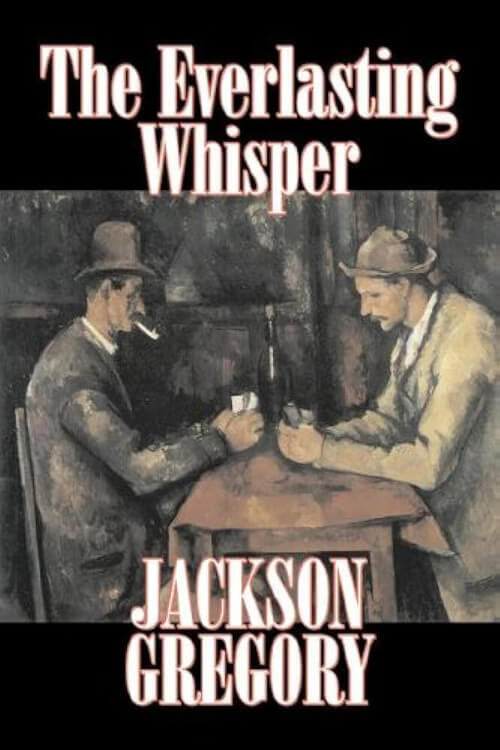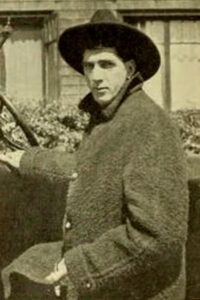
The Everlasting Whisper, A Tale of the California Wilderness
It was springtime in the California Sierra. Never were skies bluer, and never did the golden sun-flood steep the endless forest lands in richer life-giving glory. Ridge after ridge the mountains swept on and fell away upon one side until in the vague distances they sank to the monotonous level of the Sacramento Valley; down there it was already summer, and fields were hot and brown. Ridge after ridge the mountains stretched on the other side, rising steadily, growing ever more august and mighty and rocky; on their crests across the blue gorges the snow was dazzling white, and winter held stubbornly on at altitudes of seven thousand feet. Thus winter, springtime, and ripe, fruit-dropping summer coexisted, touching fingers across the seventy miles that lie between the icy top of the Sierra and the burning lowlands.
Here, in a region lifted a mile into the rare atmosphere, was a ridge all naked boulder and spire along its crest, its sides studded with pine and incense cedar. The afternoon sunlight streaked the big bronze tree trunks, making bright gay spots and patches of light, casting cool black shadows across the open spaces where the brown dead needles lay in thick carpets. It was early June, and thus far only had the springtime advanced in its vernal progress upward through the timbered solitudes. Some small patches of snow still lingered on in spots sheltered from the sun, but now they were ebbing away in thin trickles. Down in a hollow at the base of the sunny slope was a round alpine lake no bigger than a pond in a city park. It was of the same deep, perfect blue as the sky, whose color it seemed not to reflect but to absorb.
A tiny fragment of this same heavenly azure drifted downward among the trees like a bit of sky falling. A second bit of blue that had skimmed across the lake and was visible now only as it rose and winged across the contrasting colored meadow rimming the pool was like a bit of the lake itself. Two bluebirds. They swerved before the meeting, their wings fluttered, they lighted on branches of the same tree and shyly eyed each other. Did a man need to have the still message of all the woods summed up in final emphasis, this it was: spring is here.
The man himself, as the birds had done before him, had the appearance of materializing spontaneously from some distilled essence of his environment. A moment ago the spaces between the wide-set cedar trees were empty. Yet he had been there a long time. It was only because he had moved that he attracted the attention even of the sharp-eyed forest folk who were returning to tree and thicket. As the bluebirds had been viewless when merged into the backgrounds of their color, so he, while sitting with his back against a tawny cedar, had been drawn into the entity of the wilderness to which he belonged. Here he blended, harmonized, and disappeared when he held motionless. The well-worn, tall, laced boots were of brown leather, much scuffed, one in color with the soil dusting them. The khaki trousers gathered into the boot-tops, the soft flannel shirt, was the brown of the tree trunks; the skin of hands and face and muscular throat were the bronze of ripe pine cones and burnished pine needles. And, in a landscape spotted with light and shadow, the head of black hair might have passed for a bit of such pitch-black shadow as a tuft of thick foliage casts upon the light-smitten ground.
Read or download Book
Jackson Gregory
Jackson Gregory (March 12, 1882 – June 12, 1943) was an American teacher, journalist, and writer.
Biography
Jackson was born in Salinas, California, the son of Monterey County attorney Durrell Stokes Gregory (1825 – 1889) and Amelia (Hartnell), and was educated at the University of California, Berkeley, earning a B.L. in 1906. Jackson began his career as a newspaper reporter in San Francisco. He later served as a principal at a high school in Truckee, where he met his future wife, Lotus McGlashan. They were wed on December 20, 1910, and the couple had two sons. Jackson then became a journalist, working in Illinois, Texas, and New York.
When their first son was born in 1912, the family settled in Auburn, California, where Jackson became a prolific writer of western and detective stories. Fifteen years later the couple moved to Pasadena, where they were divorced. Jackson then moved in with his brother Edward, who was living in Auburn. He died there on June 12, 1943, while working on a novel titled The Hermit of Thunder King. Jackson Gregory authored more than 40 fiction novels and several short stories. Several of his tales were used as the basis of films released between 1916 and 1944, including The Man from Painted Post (1917).






